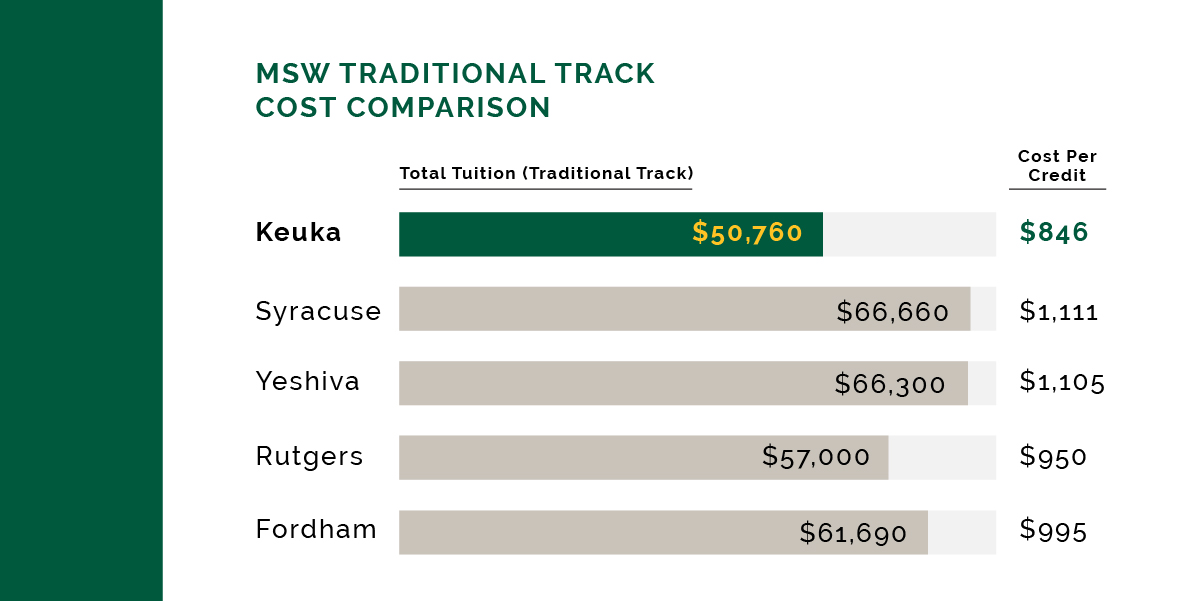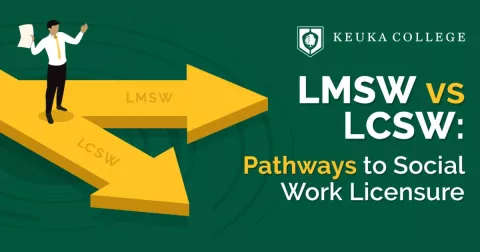Master of Social Work Traditional Track
Become a Leader in Clinical Social Work
With an online Master of Social Work (MSW) degree from Keuka College and your license as a clinical social worker, you can address the growing need in our society for mental health services and improve the lives of people in your community.
The traditional track of this program is for students without a social work degree looking to change careers. If you have a BSW, see the Advanced Track.
Our clinically-focused online Master of Social Work degree program will:
- Equip you with clinical mental health treatment skills
- Provide you with versatile social work knowledge that translates to a range of generalist roles and leadership positions
- Provide experience needed to work in a variety of fields, including mental health, addiction and substance abuse, and family and youth services
- Fully prepare you to pursue licensure as a licensed clinical social worker (LCSW), allowing you to serve as a mental health provider and accept insurance referrals
Program Features
Program Length
2.6 years
Credit Hours
60
Field Hours
900
Program Facts
- 100% online Master of Social Work - No campus requirements
- CSWE-accredited clinical social work program
- Field placement support provided in your region
- Learn from experts and become an expert: Faculty are LCSWs who are active in the field
- #1 Provider of Social Work Degrees in New York*
*#1 provider of BSW degree in New York, National Center of Educational Statistics, 2019
U.S. News & World Report
Admission Requirements
- Bachelor’s degree in any discipline
- Minimum Cumulative GPA: 2.75 or higher
- 2 Letters of recommendation
- Resume
- Essay
- Personal Statement
- GRE is not required
Dedicated to Your Impact:
Field Placement and Student Support Services
Field hours allow students to make a tangible impact and build strong connections within their communities before they graduate. Additionally, they can gain exposure and begin networking with potential employers. Our dedicated field placement team works with you to find sites in your local community to achieve the 900 hours of real-world, hands-on experience required to graduate. Your Student Success Advisor will discuss your goals and interests to help identify the right fit for your field education placement site.
This service is included in the program cost and allows you more time to focus on your coursework. Our online students experience a close-knit community and the personalized support of a small private school, the same as if they were on campus. Your dedicated Student Success Advisor provides dedicated support to ensure success throughout your Keuka College online learning experience from enrollment to graduation.
Curriculum Snapshot - Online Clinical MSW Traditional Track
"I truly appreciated the assignments that required us to interact and engage with the community. This was a great hands-on way to get us involved and to understand the challenges that will likely be produced with client advocacy." - Keuka College MSW student
The purpose of this course is for students to develop a critical understanding of the NASW Code of Ethics, scrutinizing ethical dilemmas and their applications, with a focus on practice with diverse populations and individual differences.
The focus of this first in a series of two courses will be on becoming familiar with the social service agency, and the intern’s role and function at the agency, as well as beginning to integrate classroom learning from the foundation courses to practice applications.
This course focuses on the student’s development and integration of professional use of self in their direct practice with family systems and couples, with emphasis on diverse populations.
This course focuses on expanding student knowledge related to human bio-psycho-social-spiritual development through the life stages, including knowledge about social systems in which individuals live (families, groups, organizations, instructions, and communities).
Field Placement FAQs
Your field placement experience will be one of the most exciting and rewarding aspects of earning your degree. These frequently asked questions will help you better understand the field placement services we provide our online students.
01
How does the field placement process work?
The field placement team collaborates with you to secure quality placement sites that reflect your educational goals, desired practice specialty, and scheduling requests. The team ensures all experiences meet CSWE accreditation standards, and the agencies and field instructors are approved prior to the start of your fieldwork.;
02
What am I responsible for to ensure a timely field experience?
Completing the field placement intake form initiates the field placement search process. Upon completion of the form, you will be required to complete all field clearance requirements (by the school and agency) prior to the start of your first field experience. Most agencies have additional requirements for the school and/or interviews that students must complete prior to starting field hours. As active participants in the placement process, and to help focus the placement team’s search, students are encouraged to provide any local sites where they would prefer to complete their field hours.
03
How do field placement services help me?
Field placement provides 900 hours of real-world, hands-on clinical social work experience. The placement team identifies and secures quality placement sites within your local community so that you can focus on your coursework and the core competencies that will help you succeed.
04
In what types of agencies do students complete their internships?
Typically, students complete their field hours at:
- Community centers/organizations
- Human service agencies
- Counseling and therapy centers
- Addiction and mental health treatment facilities
- Adoption agencies
- Senior care facilities, such as nursing homes
- Correctional facilities
- Hospitals/Clinics
Why Choose a Clinical Master of Social Work program?
One of the benefits of earning a clinical MSW degree is its versatility. Not only can you practice as a mental health provider, but you’ll also gain strong qualifications that translate well within the social work profession across many generalist roles and leadership positions in various types of organizations. Read more on clinical vs. generalist social work.
| Clinical Social Work | Generalist Social Work | |
|---|---|---|
| Overview | Focuses on the assessment, diagnosis, treatment, and prevention of mental illness, emotional, and other behavioral disturbances | Has a range of applications within organizations, initiatives, agencies, advocacy groups, community organizations, healthcare, and more |
| Credentialing | Requires distinct clinical social work licensure at the state level | Licensure for generalist social work at the state level |
| Minimum education | Accredited MSW | Accredited MSW or BSW (separate licensure levels) |
| Scope of practice | In addition to being qualified for a range of generalist roles, state-licensed clinical social workers (LCSWs) can practice as therapists/mental healthcare providers who are eligible for insurance reimbursement | More applicable to organizational or community roles in a variety of systems, including public service, nonprofit, education, criminal justice, policy, advocacy, healthcare, and within the private sector |
| Best suited for | Professionals interested primarily in providing therapeutic mental health services in individual, family, or group environments | Professionals more interested in macro-level practice with groups and communities, such as case management and social program leadership |
Why Choose Keuka?
Keuka College's Online Master of Social Work program is a top choice for aspiring social work professionals due to its unique features. The program stands out with dedicated field placement support, ensuring hands-on experiences in students' local communities.
Beyond academics, the program prioritizes holistic well-being by offering mental health resources. The high quality, rigor, affordability, and commitment to excellence of Keuka College’s Online Master of Social Work program make it a leader in online social work education, empowering change-makers nationwide.
Financial Aid Options
A Keuka College education is an investment in your future and more affordable than you may think.
Supports such as the Free Application for Federal Student Aid (FAFSA) and the New York State Tuition Assistance Program (TAP) can help cover your education cost and pave the way for your future career.
Additionally, there are a variety of scholarship opportunities available for students who meet certain criteria. Simply complete your application for admission and submit your FAFSA to see available scholarships.
At $846 per credit, Keuka College's affordable MSW program outshines the competition.
Looking to learn more about the variety of financial aid support available to students, including government grants? Check out Keuka College’s Tuition and Financial Aid resources.
Frequently Asked Questions
If you don’t find the answers to your questions here, Email Your Enrollment Advisor.
The online MSW program is accredited by the Council on Social Work Education (CSWE). CSWE accreditation can improve your chances of licensure and career options through its standardization of educational criteria. Download our Assessment of Student Learning to learn more. Keuka College is a regionally accredited institution by the Middle States Commission on Higher Education (MSCHE).
This online MSW program is taken on a part-time basis and requires 60 credit hours, 900 field practicum hours, and can be completed in 2.6 years. Students on this track without a Bachelor of Social Work (BSW) take the foundational courses first, followed by the core courses.
The traditional track program costs $846 per credit hour, for a total program investment of $50,760 (plus applicable fees). A variety of financial aid options are available to our online students. Learn more.
Rest assured, you will be educated by a committed faculty of clinicians, scholars, and peers who share your passion for providing mental health services. All of our educators are licensed social workers who practice in the field, many of whom are also active researchers advancing the field of social work.
One of the benefits of earning a clinical MSW degree is its versatility. Not only can you practice as a mental health provider, but you’ll also gain strong qualifications that translate well within the social work profession across many generalist roles and leadership positions in various types of organizations. Read more on clinical vs. generalist social work.
Graduates with a master’s degree from our clinical-focused program can not only practice as mental health providers in private practice, but this versatile degree translates well to many generalist roles and leadership positions within organizations. Example careers for MSW graduates include:
- Psychotherapist
- Substance abuse counselor
- Agency executive director/administrator
- School social worker
- Youth services advocate
- Medical social worker
- Family social worker
Licensed Clinical Social Worker: A Career In Demand
Pursuing a Licensed Clinical Social Worker (LCSW) credential can significantly enhance your career prospects in this growing field. Online Master's in Social Work (MSW) programs offer flexible pathways for earning an advanced degree, such as a Master of Social Work (MSW), which can then make you eligible to apply for an LCSW.
You can gain the skills needed to work in high-demand areas like mental health and substance abuse, where job growth is projected at 10% through 2033 according to the BLS. With the flexibility of online learning and no on-campus requirements, working professionals can balance education with their current responsibilities while preparing for a rewarding career.
The demand for LCSWs is driven by specialized training, equipping them to provide therapy and support in diverse settings. The median annual wage for social workers was $61,330* in May 2024 with LCSWs making approximately 23% more than BSW-level social workers and 21% more than MSW-level social workers without clinical licensure.** Pursuing an MSW through a CSWE-accredited, online program positions you to become Certified as an LCSW for both competitive salaries and impactful roles in addressing societal needs.
- Social work employment is projected to grow 7 percent from 2023 to 2033, faster than the average for all occupations, to 811,800 social work jobs.
- About 67,300 openings in social work positions are projected each year, on average, over the decade (2023-2033).
- Social workers held about 751,900 jobs in 2023.
Projected employment of social workers varies by occupation, but all positions are growing.
- Child, family, and school social workers are expected to grow 5%
- Healthcare social workers are projected to grow 10%
- Mental health and substance abuse social workers are anticipated to grow 10%
- All other social workers are expected to grow 7%
Online MSW Program Themes
Professional and Ethical Development
Build your professional identity and capabilities to practice ethical, conscious, and informed clinical social work practice.
Clinical Social Work Competencies
Expand and integrate theoretical knowledge and skills through which social work assessment and intervention may be carried out.
Integrating Theory and Evidence-Based Practice
Apply skills through experiential learning, along with discussion and assignments that support the integration of theory as well as professional ethics and values.
Social Policy, Diversity, and Human Rights
Explore the framework of social welfare policy in the United States to become an informed advocate for human rights.








